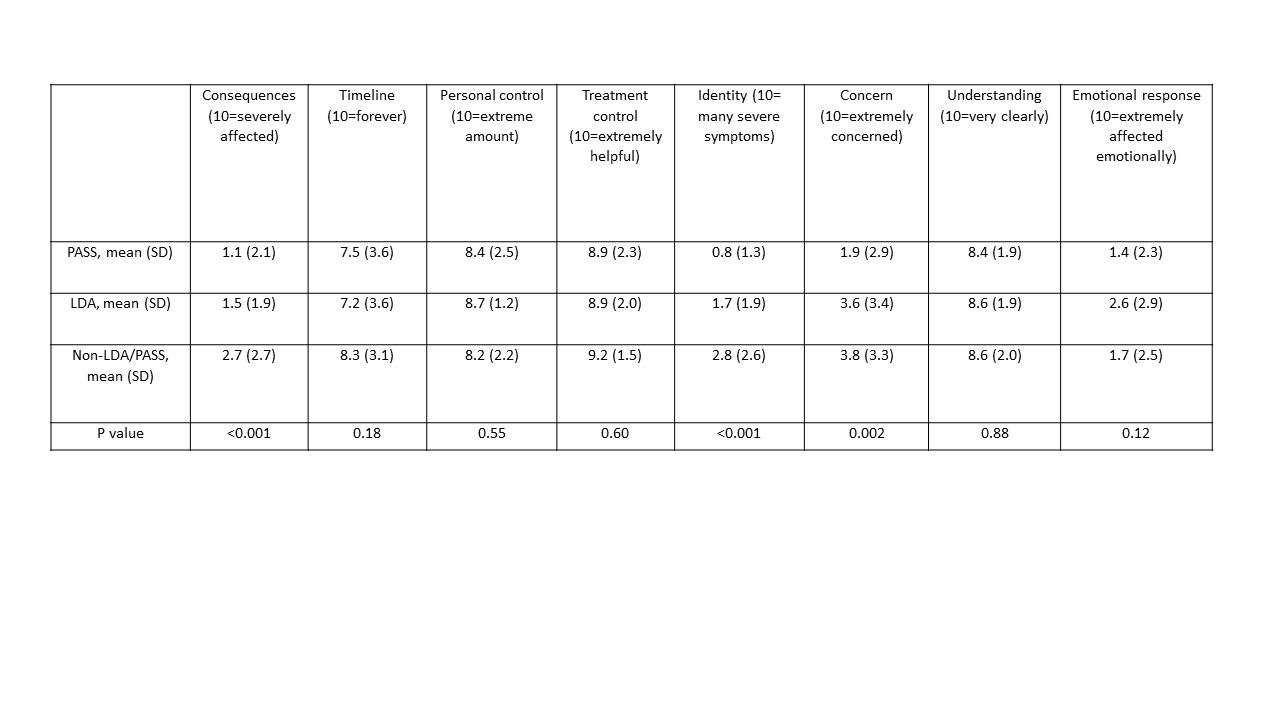Session Information
Date: Monday, November 18, 2024
Title: Metabolic & Crystal Arthropathies – Basic & Clinical Science Poster III
Session Type: Poster Session C
Session Time: 10:30AM-12:30PM
Background/Purpose: Gout flares are the most important clinical feature for people who have the disease. Given currently available treatment possibilities and limitations, low disease activity (LDA) has been described as a useful treatment target for both physicians and patients, while a patient acceptable symptom state (PASS) has been defined as a tolerable level of symptoms. In gout, a hypothetical maximum flare occurrence in the preceding six-months has been suggested to be no flares for PASS and only one flare for LDA (Taylor, J Rheumatol 2021). The aim of this analysis was to determine the relationship between gout flare states (PASS, LDA, and not in LDA or PASS (non-LDA/PASS)) and patient reported outcomes
Methods: Post hoc analyses of variance were undertaken using data from a 12-month RCT involving 179 people with gout. The RCT compared low-dose colchicine to placebo for the first six months while starting allopurinol, with a further 6-month follow up after ceasing colchicine/placebo. Self-reported gout flares were collected monthly. HAQ, pain VAS, patient global VAS, and EQ-5D-3L were completed 3-monthly and the gout-specific brief illness perception questionnaire (BIPQ) was collected at months 0, 6, and 12.
Results: VAS, and EQ-5D-3L were completed 3-monthly and the gout-specific brief illness perception questionnaire (BIPQ) was collected at months 0, 6, and 12.
Results: In the final six months of the study 68 (38%) participants were classified as being in PASS, 34 (19%) as in LDA, and 77 (43%) as non-LDA/PASS. There was no association between gout flare states and the EQ-5DL or HAQ. There was a statistically significant association between three of the eight BIPQ items, with increasing consequences, identity and concern scores across the three states of PASS, LDA, and non-LDA/PASS (Table 1).
Conclusion: The majority of people (57%) were able to achieve PASS or LDA in the second six months after commencing urate lowering therapy. As the flare burden increases, so does the impact of gout and patient concerns. These findings highlight the importance of flare prevention in the management of gout
To cite this abstract in AMA style:
Stamp L, Frampton C, Stewart S, Petrie K, Edwards N, Gaffo A, Dalbeth N. Relationship Between Gout Flare Burden and Patient-Reported Outcome Following Allopurinol Initiation [abstract]. Arthritis Rheumatol. 2024; 76 (suppl 9). https://acrabstracts.org/abstract/relationship-between-gout-flare-burden-and-patient-reported-outcome-following-allopurinol-initiation/. Accessed .« Back to ACR Convergence 2024
ACR Meeting Abstracts - https://acrabstracts.org/abstract/relationship-between-gout-flare-burden-and-patient-reported-outcome-following-allopurinol-initiation/

